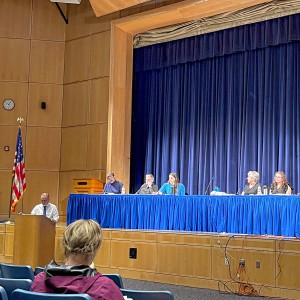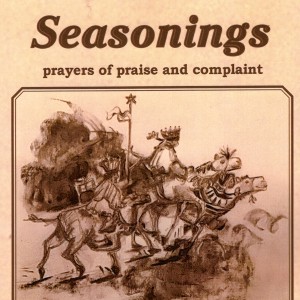Faith Matters: What is this Christian nationalism?
| Published: 06-30-2023 5:29 PM |
With Independence Day approaching, I started thinking about the strange phrase “Christian nationalism.” I wonder if this is what it means.
Marcus Borg and John Dominic Crossan begin their book “The Last Week” with the defining imagery of Jesus quite famously riding into Jerusalem before Passover on a donkey in the midst of a peasant procession. This procession enters the walled city from the east. Pontius Pilate, the Roman governor, enters Jerusalem at the head of a column of imperial cavalry and soldiers. They enter from the west. Jesus’ procession intentionally counters what is happening on the other side of the city. It is Jesus’ boldfaced protest against everything symbolized by the violence, rapaciousness and vanity of imperial power.
The imperial parade and Jesus’ counter-protest will culminate by the end of the week with that same Pontius Pilate crucifying Jesus. The contrast could not be more well defined. I imagine, therefore, that Christian nationalism embraces the peacemakers of the world, and that a Christian nation would strive to reflect this in its spending priorities and its foreign policy.
So Jesus is honored by a peasant procession. The elite conspired to crucify Jesus, while the hoi polloi are energized by Jesus’ ministry and message. Maybe this is because they matter to Jesus, maybe because he offers them hope and dignity. Early in his ministry, Jesus preaches to a great crowd on the plain, offering his blessings upon the poor, the hungry and the despondent, while reproaching the rich for not seeing the suffering of others as being their concern.
This is not the place for numbers and solutions, but they’re all there in Matthew Desmond’s books “Evicted” and “Poverty, By America.” Desmond argues the United States operates under a system that has been hijacked to benefit the wealthy at the expense of the poor. Christian nationalism would seem scandalized by such a reversal of Jesus’ ministry and message, and a Christian nation would reflect this in its policies and programs so that those most in need would be those most on the nation’s radar.
But also, Jesus will not be confined by the expectations of the masses. A familiar New Testament theme is his embrace of society’s and religion’s outcasts. Tax collectors were hated as enablers of the Roman occupiers, but this public disgust does not stop Jesus from reaching out to them. The masses are prejudiced against the Samaritans, but Jesus will have none of it. Women are not equals in Jesus’ society, but Jesus speaks to Mary, Martha’s sister, as if she is a disciple. Jesus touches a man with leprosy and his ritual uncleanness is transferred to Jesus, and Jesus is touched by a woman who is hemorrhaging so that her uncleanness passes on to him as well, but Jesus overrules such religious opprobrium in favor of love and compassion. The woman of Sychar, the woman caught in adultery, and the sinful woman who anoints Jesus’ feet in a Pharisee’s home are outside of decent society, but not outside of Jesus’. Christian nationalism should, I would guess, be repulsed by prejudice in any of its ugly forms and lean definitively toward extravagant welcome.
Jesus is also not limited by inclusion either. Luke shares an instructive story. Two disciples James and John have witnessed the Transfiguration of Jesus. They have seen his divine nature. Less than 15 verses later, we are told in the Bible that a Samaritan village rejects Jesus. The disciples’ reflex is to call judgment down upon the Samaritans for insulting the one they have seen glorified. Jesus’ anger does not burn against those who rejected him, but against two of his closest followers who imagine that violence should be their expected response.
Jesus invests himself in love and it angers him when his followers grasp for vengeance instead. Christian nationalism, accordingly, would not presume to foist its religion upon others nor denigrate the faith of others. Christian nationalism would not need the power of the nation through its schools or laws to force their beliefs upon others because this denies the power of those beliefs to convince.
Article continues after...
Yesterday's Most Read Articles
 Bridge of Flowers in Shelburne Falls to open on plant sale day, May 11
Bridge of Flowers in Shelburne Falls to open on plant sale day, May 11
 As I See It: Between Israel and Palestine: Which side should we be on, and why?
As I See It: Between Israel and Palestine: Which side should we be on, and why?
 $12.14M school budget draws discussion at Montague Town Meeting
$12.14M school budget draws discussion at Montague Town Meeting
 Greenfield homicide victim to be memorialized in Pittsfield
Greenfield homicide victim to be memorialized in Pittsfield
 Fogbuster Coffee Works, formerly Pierce Brothers, celebrating 30 years in business
Fogbuster Coffee Works, formerly Pierce Brothers, celebrating 30 years in business
 Streetlight decision comes to Shelburne Town Meeting
Streetlight decision comes to Shelburne Town Meeting
Above is how I envision Christian nationalism. The ones who actually use the phrase see it quite differently. However one imagines Christian nationalism, it is irrelevant because the United States is not a theocracy.
Independence Day celebrates the Declaration of Independence. Thomas Jefferson was its principal author. Jefferson was a strict proponent of the separation of church and state. He did this to protect both: the state from religion’s “tyranny over the mind of man;” and religion from the insincerity of imposed belief. In his 1821 autobiography, Jefferson wrote religious freedom “meant to comprehend, within the mantle of its protection, the Jew and the Gentile, the Christian and Mahometan, the Hindoo and infidel of every denomination.” He even boasted about the religious freedom of the infidel, which is anyone who did not believe or who believed unconventionally. As a person of faith, I am grateful for this because state-sanctioned religion impoverishes both state and religion. It dilutes the difficult gospel themes noted above by turning faith into politics.
The First Congregational Church of Sunderland, United Church of Christ, has ministered to our local communities since 1717. Sunday Services begin at 11 a.m. The church’s website and Facebook page are found under First Congregational Church of Sunderland. The church’s phone number is 413-665-7987. If you wish to reach Rev. Randy Calvo, email him at randyc1897@gmail.com. We offer religious education for the youth and Bible study for adults. Anthony Tracia directs our music program, and we have a bell choir. We are an official “Open and Affirming” congregation so when we say “All are welcome here,” we mean it.

 Speaking of Nature: Indulging in eye candy: Finally, after such a long wait, it’s beginning to look like spring is here
Speaking of Nature: Indulging in eye candy: Finally, after such a long wait, it’s beginning to look like spring is here Celebrating ‘Seasonings’: New book by veteran preacher and poet, Allen ‘Mick’ Comstock
Celebrating ‘Seasonings’: New book by veteran preacher and poet, Allen ‘Mick’ Comstock Faith Matters: How to still the muddy waters of overthinking: Clarity, peace and God can be found in the quiet spaces
Faith Matters: How to still the muddy waters of overthinking: Clarity, peace and God can be found in the quiet spaces A time for every purpose under heaven: Free sing-a-long Pete Seeger Fest returns to Ashfield, April 6
A time for every purpose under heaven: Free sing-a-long Pete Seeger Fest returns to Ashfield, April 6
